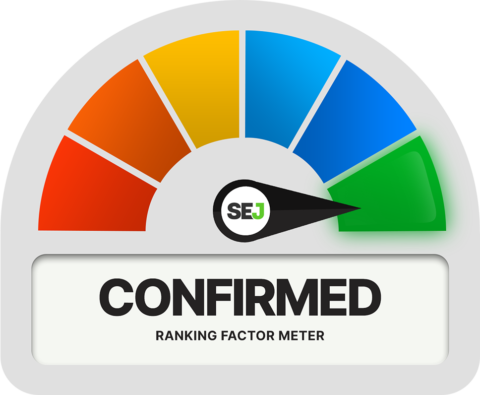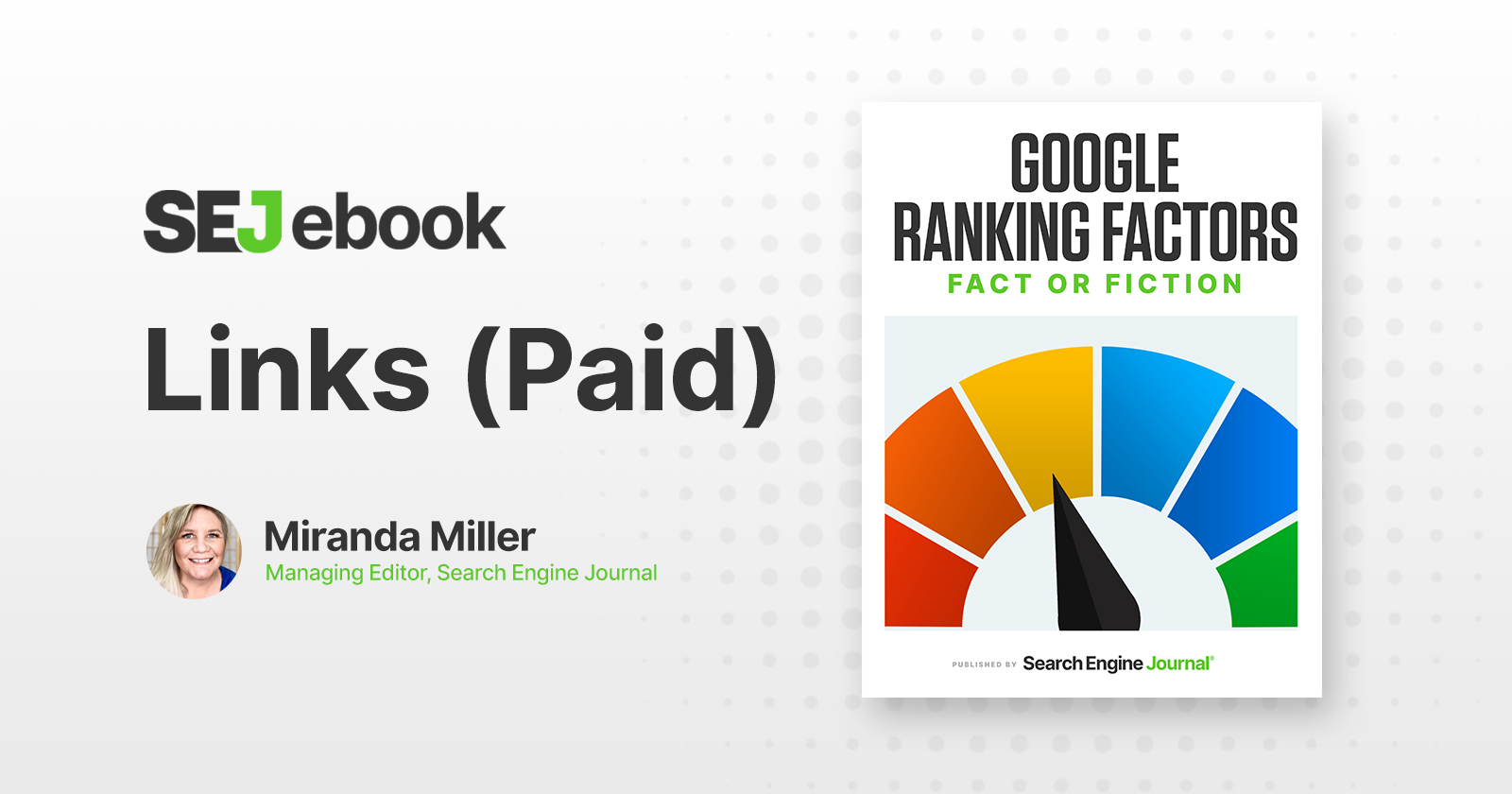Google flat out tells us that links help them evaluate a site’s reputation, and that search rankings are “partly based on analysis of those sites that link to it.”
We know that links are a ranking factor.
And we know that organic links can be difficult to come by.
Can you just buy links and enjoy the same ranking benefits as those earned through the quality of your content, building your reputation and authority, and sharing valuable expertise people can’t get elsewhere?
Sure, you can buy them. There’s no shortage of people willing to sell you links.
In this piece, we’ll explore whether those paid links will actually help you rank higher.
The Claim: Paid Links As A Ranking Factor
Google’s Webmaster Guidelines are clear on paid links. They don’t want them influencing search rankings. Google says:
“Make a reasonable effort to ensure that advertisement links on your pages do not affect search engine rankings. For example, use robots.txt, rel=”nofollow”, or rel=”sponsored” to prevent advertisement links from being followed by a crawler.”
That doesn’t mean paying for links is inherently bad. You just have to be honest and open about it.
But what if you could sneak one (or several) paid links by Google?
Surely they can’t algorithmically detect all paid links, especially if you’re super careful. Right?
In that case, if you didn’t disclose that it was a paid link and were careful there was no footprint to speak of, that link would provide the same benefit as any organic link.
That’s true.
And it’s also a dangerous game to play.
Here’s why.
The Evidence For Paid Links As A Ranking Factor
We know that links pass PageRank and impact search rankings. That’s not even a question.
However, Google asks that you disclose when there’s some relationship outside of, “Hey, this is a super valuable/reputable/authoritative page I genuinely want to share with my audience!” behind the link.
The way you explain that relationship to Google is through rel attribute values in the link’s <a> tag:
- rel=”sponsored” says, “This is an advertisement and paid placement.” It won’t pass PageRank and Google will basically disregard it.
- rel=”ugc” says, “This is user generated content and we aren’t making any endorsements as to its quality or accuracy.”
- rel=”nofollow” says, “This isn’t a site we want to be associated with, so please don’t follow this and crawl that page.”
(Nofollow was the precursor to rel=”sponsored” and is still an acceptable markup for paid links. However, Google would prefer that you use the sponsored tag for all paid links.)
If you choose not to disclose a paid relationship or transaction, you may very well enjoy some ranking benefits.
Until you’re caught.
And when that happens, you’re lucky if Google simply ignores the link.
Paid Links Can Make It Impossible To Rank, Too
If Google finds that you’re using paid links to manipulate the algorithm, you might find that your site is removed from the index.
People have been trying to manipulate links and profit from selling them – and Google has been clapping back – since the engine’s earliest days.
One particularly comical lawsuit from 2002 makes Google’s position on the practice of selling links clear.
It was the case of Search King Inc. v. Google Technology Inc.
Search King sued Google for “maliciously” eliminating the PageRank of its link selling scheme, PRAN.
Search King was selling links on high-ranking sites. He tried to argue that because PageRank was described as “honest, objective, and mechanical” in Larry Page’s thesis paper and in Google material, taking manual action against his link scheme was anti-competitive.
In her opinion, District Judge Vicki Miles-Lagrange explained:
“Search King asserts the devaluation occurred after and because Google learned that PRAN was competing with Google and that it was profiting by selling advertising space on web sites ranked highly by Google’s PageRank system.”
Search King’s case was dismissed and the lesson to the industry was clear: If you’re caught participating in paid link schemes, you’ll get slapped.
And if you try to sue Google for deindexing or otherwise penalizing you for it, you will lose.
In a 2005 blog post, Matt Cutts explained that while the algorithm took care of most paid link issues, Google was not averse to manually intervening:
“Yes, Google has a variety of algorithmic methods of detecting such links, and they work pretty well. But these links make it harder for Google (and other search engines) to determine how much to trust each link. A lot of effort is expended that could be otherwise be spent on improving core quality (relevance, coverage, freshness, etc.).
“At the point where people are recommending ways to make paid links less detectable (e.g. by removing any labels or indication that the links are sold), I wouldn’t be surprised if search engines begin to take stronger action against link buying in the near future.”
Even so, SEO pros have largely believed since about 2010 or so that if Google determines a link has been paid for, it’ll just ignore it.
But recent manual interventions show that Google isn’t messing around with paid link schemes at scale.
In 2019, Google Gary Illyes tweeted his gratitude to someone who had submitted a spreadsheet with over 700 domains selling links that passed PageRank:
Google also appears to have taken manual action against a law firm for its scholarship link building scheme in December 2020.
In that case, the links weren’t directly bought or sold.
But as Search Engine Journal’s Roger Montti explained at the time,
“…the links aren’t contextually relevant nor do they qualify as a true citation or ‘link-vote’ that vouches for the law office.”
Today, the search engine’s Paid Links resource says,
“Google works hard to ensure that it fully discounts links intended to manipulate search engine results, such as excessive link exchanges and purchased links that pass PageRank.”
But it’s clear that even outside of algorithmic detection, Google is on the hunt for unnatural links. And that includes links that are exchanged for some kind of value – monetary or otherwise.
Google has long asked the SEO industry to police itself by reporting paid links and other link schemes.
This means what Google’s algorithm might pick up on isn’t your only concern.
If competitors (or their agencies) sniff out your paid links, you might find yourself on the wrong end of one of those reports. And the action that results.
Paid Links: Err On The Side Of Caution
SEO pros have long argued over what constitutes a paid link and whether Google has any right to ask marketers to disclose the relationships behind links.
See this 2006 article from Loren Baker, for example.
Today, Google defines the following as link schemes that can negatively impact a site’s search ranking:
- Buying or selling links that pass PageRank. This includes:
- Exchanging money for links, or posts that contain links.
- Exchanging goods or services for links.
- Sending someone a “free” product in exchange for them writing it and including a link.
- Text advertisements that pass PageRank.
- Advertorials or native advertising where payment is received for articles that include links that pass PageRank.
Google says paid links don’t work.
That’s not entirely true, though.
Paid links work in the same way as any other link unless they are:
- Tagged as sponsored or nofollow using rel attribute values.
- Algorithmically determined to have been manipulated in some way.
- Manually reported or detected as undisclosed paid links.
Two of those options – disclosing their paid status yourself and algorithmic detection – will result in Google simply ignoring the link. You still gain any associated branding, advertising, or other value from it.
The third could result in your ticking off the webspam team and incurring a manual action.
And in that case, you risk not only losing the value of the link but all of your other SEO efforts, too.
Paid Links As A Ranking Factor: Our Verdict

Google uses links as a ranking signal. However, they explicitly do not want paid links to count.
Yes, you can try to hide it from them.
But you do so at your own risk — and the fallout can be devastating.
Using undisclosed paid links to improve search rankings is the SEO equivalent of strapping a bomb on your site.
If you’re lucky, it’s wired wrong and nothing will happen.
But one day, you just might find that someone has tossed Gary Illyes the detonator.
And he’ll gleefully flip the switch, make no mistake.
Featured Image: Paulo Bobita/Search Engine Journal
